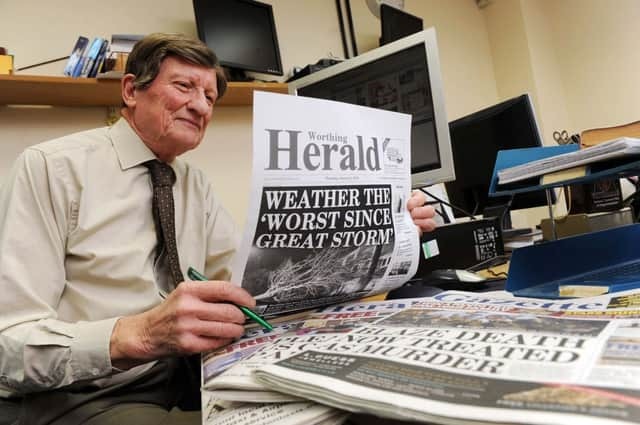Local news stalwart ends 55-year career


The local news stalwart was filing copy right up until New Year’s Eve, when he finally hung up his notebook at the age of 76.
As a schoolboy, Mr Stephens always wanted to be a reporter, and at 13 he took a job at the Bletchley Gazette, doing odd jobs on press night.
Advertisement
Hide AdAdvertisement
Hide AdDuring a brief stint with Royal Mail, Mr Stephens studied typing, English, history and shorthand at night school with the aim of becoming a reporter.
In 1958 he was hired as a junior reporter on the Bletchley Gazette, where he spent three years learning his trade, before moving to the Worthing Herald in 1961.
After three years on the reporters’ desk, Mr Stephens move into sub-editing and became news editor of the Shoreham Herald.
He then became assistant editor at the Worthing Gazette and Herald, where he stayed until 1978.
Advertisement
Hide AdAdvertisement
Hide AdMr Stephens then spent 14 years at the Brighton Evening Argus, as business editor and motoring editor, during which he travelled the world and flew on Concorde.
He returned to Worthing in 1993, taking a job at the Worthing Guardian, where he remained until his official retirement ten years later.
It was then, in 2003, that he came back to the Herald, and spent a decade as a reporter, until December 30, 2013.
Editor Colin Channon said: “He’s a journalist of the old school with old fashioned values, who can spot a story at 20 paces. Everyone in the newsroom will miss him.”
Advertisement
Hide AdAdvertisement
Hide AdMr Stephens said he had enjoyed the cut and thrust of covering a couple of murder stories over the years, as well as the 2004 Sherylgate saga.
“I have always been a news seeker,” he said. “I like to be able to recognise a story.”
Speaking about how the industry has changed over the years, Mr Stephens said: “One of the most challenging things has been the introduction of new technology. I’ve forgotten how to change a type writer ribbon and I’ve thrown away the Tip-Ex.”
“But you do get more freedom to let your thoughts flow onto the page.
Advertisement
Hide AdAdvertisement
Hide Ad“Google has opened up a whole world of knowledge you can apply to your writing to make sure you get your facts right.
“But the best technology in the world won’t make up for inaccuracy as far as newspapers are concerned.”
As for advice for aspiring young journalists, Mr Stephens had this to say: “Read as much as you can. You’ll come up against words you haven’t read before, and any word you don’t understand, check it out.”
Mr Stephens said the reporter’s workload was now more onerous and there were fewer people on the ground.
Advertisement
Hide AdAdvertisement
Hide AdHe said the Herald used to have up to 20 reporters but it now has four or five.
“The news desk has been decimated compared with the old days,” he said. “There were more staff then and the workload was shared.”
Mr Stephens said he remembered phoning copy through at 9pm from the town hall following council meetings, and it would appear in print on the breakfast table the next day.
“There were no emails in those days. Reporters spent a lot more time out and about,” he said. “There was a lot more of a social life too in the early days. You went to dinners and functions and got to meet a lot more people.
Advertisement
Hide AdAdvertisement
Hide Ad“You weren’t tied to the office so much and you got to know a much wider selection of townspeople.
Mr Stephens described how he once found a front page story just by being nosey and able to read upside-down - a skill learned when newspapers were printed using hot metal.
“I wen to Lancing police station on a Thursday for the police check and the log was there on the table,” he said.
“It said ‘man in accident at refuse tip’. As it turned out, he was crushed in the back of a rubbish van. All it took was a quick call to say hold the page and we had a front page lead the next day.”
Advertisement
Hide AdAdvertisement
Hide AdMr Stephens said it was important to have a good rapport with one’s teammates. “I have enjoyed many of those over the years,” he added.
Now retired, Mr Stephens hopes to spend more time with his wife Helen, their two children and two grandsons,
“Mentally, I still feel news inquisitive. I still have a hunger to read a good story.”